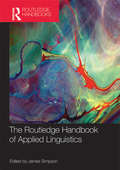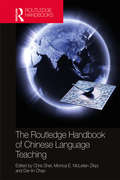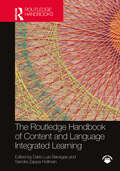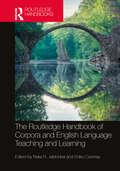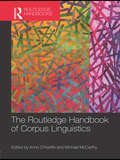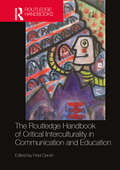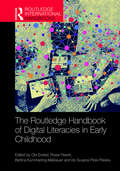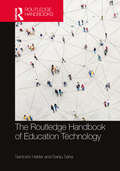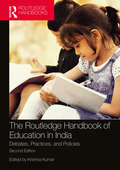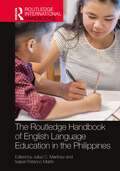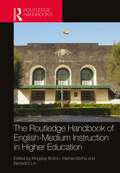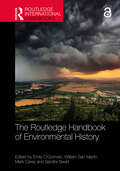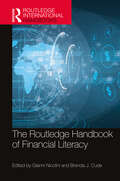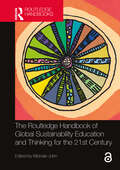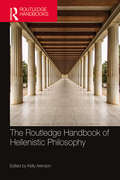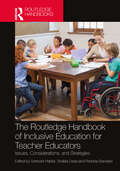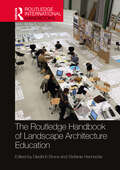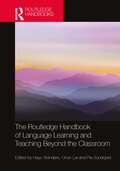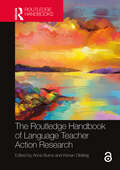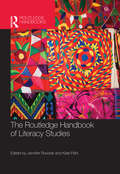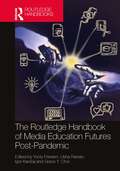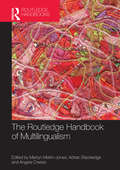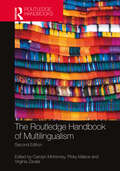- Table View
- List View
The Routledge Handbook of Applied Linguistics (Routledge Handbooks in Applied Linguistics)
by James SimpsonThe Routledge Handbook of Applied Linguistics serves as an introduction and reference point to key areas in the field of applied linguistics. The five sections of the volume encompass a wide range of topics from a variety of perspectives: applied linguistics in action language learning, language education language, culture and identity perspectives on language in use descriptions of language for applied linguistics. The forty-seven chapters connect knowledge about language to decision-making in the real world. The volume as a whole highlights the role of applied linguistics, which is to make insights drawn from language study relevant to such decision-making. The chapters are written by specialists from around the world. Each one provides an overview of the history of the topic, the main current issues and possible future trajectory. Where appropriate, authors discuss the impact and use of new technology in the area. Suggestions for further reading are provided with every chapter. The Routledge Handbook of Applied Linguistics is an essential purchase for postgraduate students of applied linguistics. Editorial board: Ronald Carter, Guy Cook, Diane Larsen-Freeman and Amy Tsui.
The Routledge Handbook of Chinese Language Teaching
by Der-Lin Chao Chris Shei Monica E McLellan ZikpiThe Routledge Handbook of Chinese Language Teaching defines Chinese language teaching in a pedagogical, historical, and contemporary context. Throughout the volume, teaching methods are discussed, including the traditional China-based approach, and Western methods such as communicative teaching and the immersion program. The Handbook also presents a pedagogical model covering pronunciation, tones, characters, vocabulary, grammar, and the teaching of listening, speaking, reading, and writing. The remaining chapters explore topics of language assessment, technology enhanced instruction, teaching materials and resources, Chinese for specific purposes, classroom implementation, social contexts of language teaching and language teaching policies, and pragmatics and culture. Ideal for scholars and researchers of Chinese language teaching, the Handbook will benefit educators and teacher training programs. This is the first comprehensive volume exploring the growing area of Chinese language pedagogy.
The Routledge Handbook of Content and Language Integrated Learning (Routledge Handbooks in Applied Linguistics)
by Darío Luis BanegasContent and language integrated learning (CLIL) is an increasingly popular educational approach given its dual focus on enabling learners to acquire subject- matter through an additional language, while learning this second language in tandem with content. This Handbook provides a comprehensive overview of recent CLIL developments, illustrating how CLIL has been uniquely conceptualised and practised across educational and geographical contexts. Divided into six sections, covering language and language teaching, core topics and issues, contexts and learners, CLIL in practice, CLIL around the world, and a final section looking forward to future research directions, every chapter provides a balanced discussion of the benefits, challenges and implications of this approach. Representing the same diversity and intercultural understanding that CLIL features, the chapters are authored by established as well as early-career academics based around the world. The Routledge Handbook of Content and Language Integrated Learning is the essential guide to CLIL for advanced students and researchers of applied linguistics, education and TESOL.
The Routledge Handbook of Corpora and English Language Teaching and Learning (Routledge Handbooks in Applied Linguistics)
by Eniko Csomay Reka R. JablonkaiThe Routledge Handbook of Corpora and English Language Teaching and Learning provides a wide-ranging and authoritative overview of the latest developments and innovations in how corpus approaches, corpus technologies, and corpus data can inform and transform English language teaching and learning. Featuring a broad range of international experts, the Handbook presents state-of-the-art scholarship and inspires new avenues for research focusing on six key areas: English language teaching and learning informed by language corpora; corpora in syllabus and materials design; corpora and English for specific and academic purposes; learner corpora for English language teaching; data-driven learning; and corpora and corpus tools for language teaching. Unique to this pioneering volume, the authors cover key areas at the cross-roads of corpus research and English language teaching by drawing on cutting-edge corpus applications, methods, and pedagogical approaches, hence, bridging the research–practice gap in the field. This Handbook is a collection of novel contributions offering essential reading for those researching and studying English language teaching and learning through the application of corpus approaches.
The Routledge Handbook of Corpus Linguistics (Routledge Handbooks in Applied Linguistics)
by Anne O’KeeffeThe Routledge Handbook of Corpus Linguistics provides a timely overview of a dynamic and rapidly growing area with a widely applied methodology. Through the electronic analysis of large bodies of text, corpus linguistics demonstrates and supports linguistic statements and assumptions. In recent years it has seen an ever-widening application in a variety of fields: computational linguistics, discourse analysis, forensic linguistics, pragmatics and translation studies. Bringing together experts in the key areas of development and change, the handbook is structured around six themes which take the reader through building and designing a corpus to using a corpus to study literature and translation. A comprehensive introduction covers the historical development of the field and its growing influence and application in other areas. Structured around five headings for ease of reference, each contribution includes further reading sections with three to five key texts highlighted and annotated to facilitate further exploration of the topics. The Routledge Handbook of Corpus Linguistics is the ideal resource for advanced undergraduates and postgraduates.
The Routledge Handbook of Critical Interculturality in Communication and Education (New Perspectives on Teaching Interculturality)
by Fred DervinThis Handbook is the first comprehensive volume to focus entirely on the notion of interculturality, reflecting on what the addition of the adjective 'critical' means for research and teaching in interdisciplinary studies.The book consists of 35 chapters, including a comprehensive introduction and conclusion. It aims to present current debates on critical interculturality and to help readers make sense of what the label implies and entails in global and local contexts, especially (where possible) beyond dominant scholarship and pedagogical practices. The chapters interrogate the use of terms in different languages to discuss interculturality, drawing on recent literature from as many different parts of the world as possible. Some contributors also problematise their own autobiographical engagement with critical interculturality in their chapters.The book will be of interest to Master's and PhD students in education, communication, and intercultural studies who wish to develop their knowledge of critical interculturality. Established researchers in these fields will also benefit from this invaluable and original source of essential reading.
The Routledge Handbook of Digital Literacies in Early Childhood (Routledge International Handbooks of Education)
by Ola Erstad Rosie Flewitt Bettina Kümmerling-Meibauer Íris Susana Pires PereiraAs fast-evolving technologies transform everyday communication and literacy practices, many young children find themselves immersed in multiple digital media from birth. Such rapid technological change has consequences for the development of early literacy, and the ways in which parents and educators are able to equip today’s young citizens for a digital future. This seminal Handbook fulfils an urgent need to consider how digital technologies are impacting the lives and learning of young children; and how childhood experiences of using digital resources can serve as the foundation for present and future development. Considering children aged 0–8 years, chapters explore the diversity of young children’s literacy skills, practices and expertise across digital tools, technologies and media, in varied contexts, settings and countries. The Handbook explores six significant areas: Part I presents an overview of research into young children’s digital literacy practices, touching on a range of theoretical, methodological and ethical approaches. Part II considers young children’s reading, writing and meaning-making when using digital media at home and in the wider community. Part III offers an overview of key challenges for early childhood education presented by digital literacy, and discusses political positioning and curricula. Part IV focuses on the multimodal and multi-sensory textual landscape of contemporary literary practices, and how children learn to read and write with and across media. Part V considers how digital technologies both influence and are influenced by children’s online and offline social relationships. Part VI draws together themes from across the Handbook, to propose an agenda for future research into digital literacies in early childhood. A timely resource identifying and exploring pedagogies designed to bolster young children’s digital and multimodal literacy practices, this key text will be of interest to early childhood educators, researchers and policy-makers.
The Routledge Handbook of Education Technology
by Santoshi Halder Sanju SahaThis handbook offers a comprehensive understanding of the use of technology in education. With a focus on the development of Education Technology in India, it explores innovative strategies as well as challenges in incorporating technology to support learning. The volume examines diverse learning approaches such as assistive technology and augmentative and alternative communication for learners with disabilities and creating more social and accessible environments for learning through Collaborative Learning Techniques (CoLTS), massive open online courses (MOOCs), and the use of AI (Artificial Intelligence) in modern classrooms. Enriched with discussions on recent trends in ET (Education Technology), university curriculum and syllabi, and real-life examples of the use of ET in different classroom settings, the book captures diverse aspects of education technology and its potential. It also discusses the challenges of making technology and resources available for all and highlights the impact technology has had in classrooms across the world during the COVID-19 pandemic. This book will be of interest to students, researchers, and teachers of education, digital education, education technology, and information technology. The book will also be useful for policymakers, educationalists, instructional designers, and educational institutions.
The Routledge Handbook of Education in India: Debates, Practices, and Policies
by Kumar KrishnaThis comprehensive handbook introduces the reader to the education system in India in terms of its structural features, its relations with society and culture, and the debates that have shaped the present-day policy ethos. The book provides an overview of major debates that have shaped India’s education systems, as well as the significant issues within higher and school education, education studies, and policies. Expert scholars provide a lucid analysis of complex themes such as the equity, access, and the quality of education. The volume also examines legal provisions and policies shaping the distribution structure and curricular issues in major areas of knowledge, as well as the provision of schools for the marginalised, economically weak, and people with disabilities. This new edition includes an analysis of the private sector’s participation in higher education and the technical and vocational education and training systems in India. This handbook will serve as a valuable resource and guide to educators and public policy practitioners seeking information about India’s contemporary educational challenges. It will also be useful to scholars and researchers of education, public policy and administration, sociology, and political studies, as well as think-tanks, the media, policy-makers, and NGOs.
The Routledge Handbook of English Language Education in the Philippines
by Isabel Pefianco Martin Julius C. MartinezThis handbook serves as a comprehensive resource on English language education in the Philippines, addressing a wide range of issues including ideologies, multilingualism, identities, policies, methodologies, assessment, teacher education, and curriculum.Chapters cover a range of educational contexts—from Luzon to Mindanao islands, from basic to higher education, and from formal to non-formal schooling. This book upholds the think and do otherwise perspective by problematizing contemporary paradigms and practices that operate from naturalized ideas inherited from the American colonizers. This includes repairing pedagogies that redress injustices experienced by historically marginalized groups and hoping for possibilities and approaches to teaching and learning English that are just, equitable, and inclusive. The six sections in the Handbook bring up conditions for thinking and doing otherwise, pointing to ways in which genuine changes can start to happen. Scholars from diverse backgrounds come together in this handbook to take collective ownership of English language education in the Philippines. This ownership does not mean ignoring and disposing of the country’s colonial past but reclaiming English language education as an ongoing project instead. This handbook likewise demonstrates that such a project makes it possible for wider audiences to see that Global South scholars from and in the Philippines also have much to teach the rest of the world about thinking and doing otherwise and, by extension, problematizing, repairing, and hoping.Given its scope and breadth, the handbook is an invaluable reference for students, pre-service and in-service teachers, teacher educators, researchers, and policymakers interested in English language, language education, TESOL, sociolinguistics, and applied linguistics.
The Routledge Handbook of English-Medium Instruction in Higher Education (Routledge Handbooks in Linguistics)
by Kingsley Bolton Werner Botha Benedict LinThis Handbook discusses the theoretical and disciplinary background to the study of English-medium instruction (EMI) in higher education worldwide. It highlights issues relating to EMI pedagogy, varying motivations for EMI education, and the delivery of EMI in diverse contexts across the world. The spread of English as a teaching medium and the lingua franca of the academic world has been the subject of various debates in recent years on the perceived hegemony of the English language and the ‘domain loss’ of non-English languages in academic communication. Encompassing a wide range of contributions to the field of EMI, the chapters of this Handbook are arranged in four distinct parts: Part I provides an overview of English-medium instruction in higher education worldwide; Part II focusses on EMI in Europe; Part III on EMI in the Middle East, North Africa, and Sub-Saharan Africa; and Part IV on EMI in the Asian region. The overall scope and level of expertise of this Handbook provides an unrivalled overview of this field of education. It serves as an essential reference for many courses dealing with applied linguistics, English language education, multilingualism, sociolinguistics, and related subjects at many levels of education, including Master’s and PhD-level studies. This Handbook serves as a valuable edition for university libraries across the world and an essential read for many faculty, undergraduate and postgraduate students, educators, and policymakers.
The Routledge Handbook of Environmental History (Routledge International Handbooks)
by Mark Carey Sandra Swart Emily O’Gorman William San MartínThe Routledge Handbook of Environmental History presents a cutting-edge overview of the dynamic and ever-expanding field of environmental history. It addresses recent transformations in the field and responses to shifting scholarly, political, and environmental landscapes. The handbook fully and critically engages with recent exciting changes, contextualizes them within longer-term shifts in the field, and charts potential new directions for study. It focuses on five key areas: Theories and concepts related to changing considerations of social justice, including postcolonial, antiracist, and feminist approaches, and the field’s growing emphasis on multiple human voices and agencies. The roles of non-humans and the more-than-human in the telling of environmental histories, from animals and plants to insects as vectors of disease and the influences of water and ice, the changing theoretical approaches and the influence of concepts in related areas such as animal and discard studies. How changes in theories and concepts are shaping methods in environmental history and shifting approaches to traditional sources like archives and oral histories as well as experiments by practitioners with new methods and sources. Responses to a range of current complex problems, such as climate change, and how environmental historians can best help mitigate and resolve these problems. Diverse ways in which environmental historians disseminate their research within and beyond academia, including new modes of research dissemination, teaching, and engagements with stakeholders and the policy arena. This is an important resource for environmental historians, researchers and students in the related fields of political ecology, environmental studies, natural resources management and environmental planning. Chapters 9, 10 and 26 of this book are freely available as a downloadable Open Access PDF at http://www.taylorfrancis.com under a Creative Commons Attribution-Non Commercial-No Derivatives (CC-BY-NC-ND) 4.0 license.
The Routledge Handbook of Environmental History (Routledge International Handbooks)
by Mark Carey Sandra Swart Emily O’Gorman William San MartínThe Routledge Handbook of Environmental History presents a cutting-edge overview of the dynamic and ever-expanding field of environmental history. It addresses recent transformations in the field and responses to shifting scholarly, political, and environmental landscapes.The handbook fully and critically engages with recent exciting changes, contextualizes them within longer-term shifts in the field, and charts potential new directions for study. It focuses on five key areas: Theories and concepts related to changing considerations of social justice, including postcolonial, antiracist, and feminist approaches, and the field’s growing emphasis on multiple human voices and agencies. The roles of non-humans and the more-than-human in the telling of environmental histories, from animals and plants to insects as vectors of disease and the influences of water and ice, the changing theoretical approaches and the influence of concepts in related areas such as animal and discard studies. How changes in theories and concepts are shaping methods in environmental history and shifting approaches to traditional sources like archives and oral histories as well as experiments by practitioners with new methods and sources. Responses to a range of current complex problems, such as climate change, and how environmental historians can best help mitigate and resolve these problems. Diverse ways in which environmental historians disseminate their research within and beyond academia, including new modes of research dissemination, teaching, and engagements with stakeholders and the policy arena. This is an important resource for environmental historians, researchers and students in the related fields of political ecology, environmental studies, natural resources management and environmental planning.Chapters 9, 10 and 26 of this book are freely available as a downloadable Open Access PDF at http://www.taylorfrancis.com under a Creative Commons Attribution-Non Commercial-No Derivatives (CC-BY-NC-ND) 4.0 license.
The Routledge Handbook of Financial Literacy (Routledge International Handbooks)
by Gianni NicoliniFinancial literacy and financial education are not new topics, even though interest in these topics among policymakers, financial authorities, and academics continues to grow. The Routledge Handbook of Financial Literacy provides a comprehensive reference work that addresses both research perspectives and practical applications to financial education. This is the first volume to summarize the milestones of research in financial literacy from multiple perspectives to offer an overview. The book is organized into six parts. The first three parts provide a conceptual framework, which discusses what financial literacy is, how it should be measured, and explains why it represents a relevant topic and effective tool in enhancing decision-making among consumers as well as consumer protection strategies. Part IV addresses the connection between financial education and financial literacy, with chapters about financial education in school settings as well as for adults. This part includes an analysis of the role of Fintech and the use of gamification in financial education. Part V is a collection of contributions that analyze financial literacy and financial education around the world, with a focus on geographical areas including the U.S., South America, Western Europe, Eastern Europe, Asia, and Africa. This part also considers how financial literacy should be addressed in the case of Islamic finance. The concluding part of the book examines how financial literacy is related to other possible approaches to consumer finance and consumer protection, addressing the relationships between financial literacy and behavioral economics, financial well-being, and financial inclusion. This volume is an indispensable reference for scholars who are new to the topic, including undergraduate and graduate students, and for experienced researchers who wish to enrich their knowledge, policymakers seeking a broader understanding and an international perspective, and practitioners who seek knowledge of best practices as well as innovative approaches.
The Routledge Handbook of Global Sustainability Education and Thinking for the 21st Century
by Michele JohnThis Handbook emerges as a pivotal resource in underscoring the important role of sustainability education in catalysing a global shift toward sustainable development. It articulates the need for a profound transformation within institutional leadership and educational frameworks to support the critical global sustainability transition.This Handbook explores sustainability thinking as a critical paradigm shift in confronting the multifaceted challenges of sustainable development. It presents an urgent case for a systemic overhaul in our approach to education in the 21st century, advocating for multidisciplinary education and holistic systems thinking in order to more successfullynavigate the complexities of sustainable development.The text discusses the foundational elements of modern sustainability thought and management, including the significance of values, ethics, governance, and the pressing issues of environmental degradation and climate change. It offers an extensive trans-disciplinary overview of sustainability discourse, spanning a broad array of perspectives on sustainability management and education.It provides a comprehensive introduction to the language of sustainability and a detailed examination of sustainability issues, highlighting their implications for education, training, and management development. It addresses urgent global issues such as decarbonisation, resource scarcity, population dynamics, pollution, and land degradation, emphasising the crucial role of educational initiatives in helping to mitigate these challenges.This seminal work has been developed for a diverse audience, including academics, policymakers, students, and educators, serving as a valuable tool for those wanting to comprehend complex global sustainability challenges and the paramount importance of education in supporting global sustainability in the 21st century.
The Routledge Handbook of Hellenistic Philosophy (Routledge Handbooks in Philosophy)
by Kelly ArensonHellenistic philosophy concerns the thought of the Epicureans, Stoics, and Skeptics, the most influential philosophical groups in the era between the death of Alexander the Great (323 BCE) and the defeat of the last Greek stronghold in the ancient world (31 BCE). The Routledge Handbook of Hellenistic Philosophy provides accessible yet rigorous introductions to the theories of knowledge, ethics, and physics belonging to each of the three schools, explores the fascinating ways in which interschool rivalries shaped the philosophies of the era, and offers unique insight into the relevance of Hellenistic views to issues today, such as environmental ethics, consumerism, and bioethics. Eleven countries are represented among the Handbook’s 35 authors, whose chapters were written specifically for this volume and are organized thematically into six sections: The people, history, and methods of Epicureanism, Stoicism, and Skepticism. Earlier philosophical influences on Hellenistic thought, such as Aristotle, Socrates, and Presocratics. The soul, perception, and knowledge. God, fate, and the primary principles of nature and the universe. Ethics, political theory, society, and community. Hellenistic philosophy’s relevance to contemporary life. Spanning from the ancient past to the present, this Handbook aims to show that Hellenistic philosophy has much to offer all thinking people of the twenty-first century.
The Routledge Handbook of Inclusive Education for Teacher Educators: Issues, Considerations, and Strategies
by Santoshi Halder, Shakila Dada and Rashida BanerjeeThis handbook provides foundational, conceptual, and practical knowledge and understanding of inclusive education and special needs education. It highlights the need for preparing special educators and teachers for inclusive classrooms to effectively cater to the needs of students with diverse needs in various low-, middle-, and high-income countries globally. It demonstrates various evidence-based and practice-based strategies required to create classrooms inclusive of diverse learners. While tracing the historical trajectory of the foundational underpinnings, philosophical bases, and crucial issues associated with inclusive education, this book presents a future roadmap and pathways through case instances and in-depth discussions to share with educators how they can strengthen their bases and make learning more inclusive in their context. It also provides an overview of the different models of assessment and their applications in the analysis of children in inclusive classroom settings. Comprehensive, accessible, and nuanced, this handbook will be of immense interest and benefit to teachers, educators, special educators, students, scholars, and researchers in the areas of social inclusion, education, special needs education, educational psychology, technology for inclusion, disability studies, among other related disciplines. It will be extremely beneficial for academicians, teacher educators, special educators, and those interested in professional teacher training courses.
The Routledge Handbook of Landscape Architecture Education (Routledge International Handbooks)
by Diedrich Bruns Stefanie HenneckeIn this handbook, 60 authors, senior and junior educators, and researchers from six continents provide an overview of 200 years of landscape architectural education. They tell the stories of schools and people, of visions, and of experiments that constitute landscape architecture education heritage. Through taking an international perspective, the handbook centers inclusivity with an appreciation for how education develops in different political and societal contexts. Part I introduces the field of education history research, including research approaches and international research exchange. Spanning more than 100 years, Parts II and III investigate and compare early and recent histories of landscape architecture education in different countries and schools. In Part IV, the book offers new perspectives for landscape architecture education. Education research presents a substantial opportunity for challenging studies to increase the pedagogic and didactic, the academic and historic, and the disciplinary knowledge basis. Through a boundary-crossing approach, these studies about landscape architecture education provide a reference to teachers and students, policymakers, and administrators, who strive for innovative, holistic, and interdisciplinary practice.
The Routledge Handbook of Landscape Architecture Education (Routledge International Handbooks)
by Diedrich Bruns Stefanie HenneckeIn this handbook, 60 authors, senior and junior educators, and researchers from six continents provide an overview of 200 years of landscape architectural education. They tell the stories of schools and people, of visions, and of experiments that constitute landscape architecture education heritage. Through taking an international perspective, the handbook centers inclusivity with an appreciation for how education develops in different political and societal contexts. Part I introduces the field of education history research, including research approaches and international research exchange. Spanning more than 100 years, Parts II and III investigate and compare early and recent histories of landscape architecture education in different countries and schools. In Part IV, the book offers new perspectives for landscape architecture education. Education research presents a substantial opportunity for challenging studies to increase the pedagogic and didactic, the academic and historic, and the disciplinary knowledge basis.Through a boundary-crossing approach, these studies about landscape architecture education provide a reference to teachers and students, policymakers, and administrators, who strive for innovative, holistic, and interdisciplinary practice.
The Routledge Handbook of Language Learning and Teaching Beyond the Classroom (Routledge Handbooks in Applied Linguistics)
by Hayo ReindersInformal language learning beyond the classroom plays an important and growing role in language learning and teaching. This Handbook brings together the existing body of research and unites the various disciplines that have explored this area, in order to present the current state of knowledge in one accessible resource. Much of adult learning takes place outside of formal education and for language learning, it is likely that out-of-class experiences play an equally important role. It is therefore surprising that the role of informal language learning has received little attention over the years, with the vast majority of research instead focusing on the classroom. Researchers from a range of backgrounds, however, have started to realise the important contribution of informal language learning, both in its own right, and in its relationship with classroom learning. Studies in the areas of learner autonomy, learning strategies, study abroad, language support, learners’ voices, computer-mediated communication, mobile-assisted language learning, digital gaming, and many others, all add to our understanding of the complex and intersecting ways in which learners construct their own language learning experiences, drawing from a wide range of resources, including materials, teachers, self-study, technology, other learners and native speakers. This Handbook provides a sound and comprehensive basis for researchers and graduate students to build upon in their own research of language learning and teaching beyond the classroom.
The Routledge Handbook of Language Teacher Action Research (Routledge Handbooks in Applied Linguistics)
by Anne Burns Kenan DikilitaşThe Routledge Handbook of Language Teacher Action Research is an authoritative and innovative treatment of language teacher action research (LTAR) as a growing research field.Edited by two global thought leaders in LTAR, it features 34 original thematic contributions from a global range of experts at the cutting edge of the field, providing a comprehensive survey not found in any other single publication. Initiatives across the world are demonstrating the value of LTAR, which has been shown to provide language teachers with strong, exciting, and influential opportunities for learning, and gaining a feeling of empowerment. This groundbreaking Handbook theorises these premises from multiple perspectives in specific areas of language teacher education and curates a broad range of original content that integrates the practical and theoretical knowledge that has emerged over the years since LTAR began to develop.This volume is a groundbreaking guide for researchers of language teaching, as well as practitioners and educators that want to harness the potential of LTAR in both theory and practice.
The Routledge Handbook of Literacy Studies (Routledge Handbooks in Applied Linguistics)
by Jennifer Rowsell Kate PahlThe Routledge Handbook of Literacy Studies offers a comprehensive view of the field of language and literacy studies. With forty-three chapters reflecting new research from leading scholars in the field, the handbook pushes at the boundaries of existing fields and combines with related fields and disciplines to develop a lens on contemporary scholarship and emergent fields of inquiry. The Handbook is divided into eight sections: The foundations of literacy studies Space-focused approaches Time-focused approaches Multimodal approaches Digital approaches Hermeneutic approaches Making meaning from the everyday Co-constructing literacies with communities This is the first handbook of literacy studies to recognise new trends and evolving trajectories together with a focus on radical epistemologies of literacy. The Routledge Handbook of Literacy Studies is an essential reference for undergraduate and postgraduate students and those researching and working in the areas of applied linguistics and language and literacy.
The Routledge Handbook of Media Education Futures Post-Pandemic (Routledge Research in Media Literacy and Education)
by Yonty Friesem Usha Raman Grace Y. Choi Igor KanižajThis handbook showcases how educators and practitioners around the world adapted their routine media pedagogies to meet the challenges of the COVID-19 pandemic, which often led to significant social, economic, and cultural hardships. Combining an innovative mix of traditional chapters, autoethnography, case studies, and dialogue within an intercultural framework, the handbook focuses on the future of media education and provides a deeper understanding of the challenges and affordances of media education as we move forward. Topics range from fighting disinformation, how vulnerable communities coped with disadvantages using media, transforming educational TV or YouTube to reach larger audiences, supporting students’ wellbeing through various online strategies, examining early childhood, parents, and media mentoring using digital tools, reflecting on educators’ intersectionality on video platforms, youth-produced media to fight injustice, teaching remotely and providing low-tech solutions to address the digital divide, search for solutions collaboratively using social media, and many more. Offering a unique and broad multicultural perspective on how we can learn from the challenges of addressing varied pedagogical issues that have arisen in the context of the pandemic, this handbook will allow researchers, educators, practitioners, institution leaders, and graduate students to explore how media education evolved during 2020 and 2021, and how these experiences can shape the future direction of media education.
The Routledge Handbook of Multilingualism (Routledge Handbooks in Applied Linguistics)
by Angela Creese Adrian Blackledge Edited by Marilyn Martin-JonesThe Routledge Handbook of Multilingualism provides a comprehensive survey of the field of multilingualism for a global readership, and an overview of the research which situates multilingualism in its social, cultural and political context. The handbook includes an introduction and five sections with thirty two chapters by leading international contributors. The introduction charts the changing landscape of social and ethnographic research on multilingualism (theory, methods and research sites) and it foregrounds key contemporary debates. Chapters are structured around sub-headings such as: early developments, key issues related to theory and method, new research directions. This handbook offers an authoritative guide to shifts over time in thinking about multilingualism as well as providing an overview of the range of contemporary themes, debates and research sites. The Routledge Handbook of Multilingualism is the ideal resource for postgraduate students of multilingualism, as well as those studying education and anthropology.
The Routledge Handbook of Multilingualism (Routledge Handbooks in Applied Linguistics)
by Virginia Zavala Carolyn McKinney Pinky MakoeThe Routledge Handbook of Multilingualism provides a comprehensive survey of the field of multilingualism for a global readership and an overview of the research which situates multilingualism in its social, cultural and political context. This fully revised edition not only updates several of the original chapters but introduces many new ones that enrich contemporary debates in the burgeoning field of multilingualism. With a decolonial perspective and including leading new and established contributors from different regions of the globe, the handbook offers a critical overview of the interdisciplinary field of multilingualism, providing a range of central themes, key debates and research sites for a global readership. Chapters address the profound epistemological and ontological challenges and shifts produced since the first edition in 2012. The handbook includes an introduction, five parts with 28 chapters and an afterword. The chapters are structured around sub-themes, such as Coloniality and Multilingualism, Concepts and Theories in Multilingualism, and Multilingualism and Education. This ground-breaking text is a crucial resource for researchers, scholars and postgraduate students interested in multilingualism from areas such as sociolinguistics, applied linguistics, anthropology and education.
